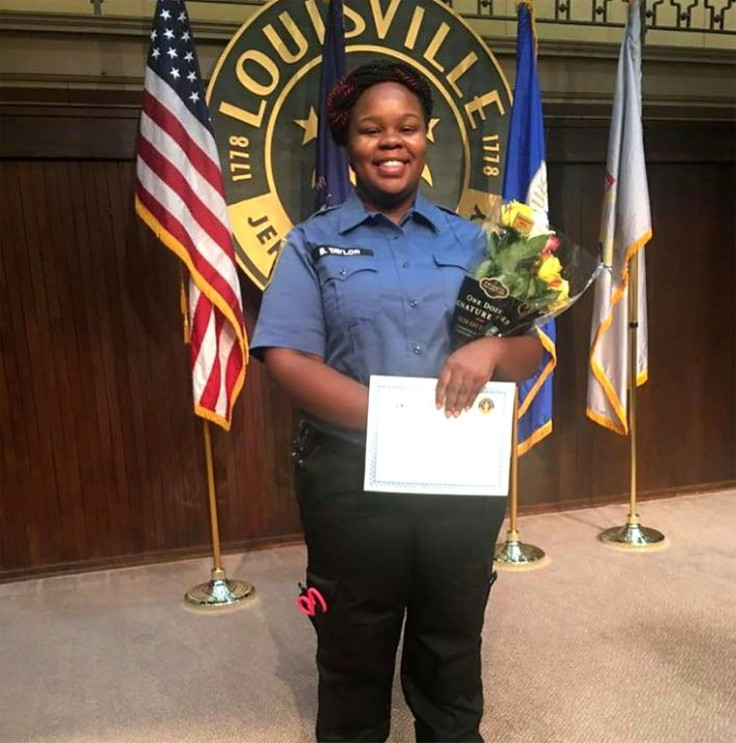Only One Officer Charged By Kentucky Grand Jury In Breonna Taylor Case
KEY POINTS
- Former Officer Brett Hankison was charged with multiple counts of wanton endangerment for the shooting of Breonna Taylor
- Louisville and several other cities are in a state of emergency in preparation for protests to the grand jury's decision
- Taylor's family previously reached a $12 million settlement in a wrongful death lawsuit against the city
A Kentucky grand jury charged one officer with multiple counts of wanton endangerment for the shooting of Breonna Taylor during the police raid on her home in March.
The charges against Officer Brett Hankison stems from him firing blindly into Taylor's apartment, endangering the lives of her neighbors. However, ballistics reports showed no rounds fired by Hankison struck Taylor.
Kentucky Attorney General Daniel Cameron said the lethal shot was fired by Officer Jonathan Mattingly, who fired multiple shots alongside Officer Myles Cosgrove into the apartment after Taylor's boyfriend fired at them. However, Cameron said the use of force was justified.
Civil rights attorney Benjamin Crump took to Twitter to criticize the charges against Hankison.
If Brett Hankison's behavior was wanton endangerment to people in neighboring apartments, then it should have been wanton endangerment in Breonna Taylor's apartment too. In fact, it should have been ruled wanton murder!
— Ben Crump (@AttorneyCrump) September 23, 2020
Reports say protests were already organizing to march in Louisville, which remains in a state of emergency. Local and state officials are asking protesters to remain peaceful and warned law enforcement will step in if necessary.
"We owe it to our community as police and as prosecutors to protect the rest of the community against violence," Kentucky Commonwealth Attorney Tom Wine told CNN. "But the rest of it, people protesting and marching demanding justice, I’m all for it. Let them march. Let them have that opportunity. Let the people in leadership positions understand the depth of their feelings and their concerns."
Officials in Illinois, Arkansas, Georgia, and Tennessee said they were monitoring the situation in Louisville and prepared to take action if potential protests turned chaotic. Illinois Gov. J.B. Pritzker said the Illinois National Guard was in a "state of readiness" should they need to be deployed.
Taylor was killed when police raided her apartment on March 13 as part of the Louisville police’s investigation into a narcotics ring in the city. One of the suspects, Jamarcus Glover, was identified as Taylor’s ex-boyfriend and police suspected her home was one of multiple locations being used to store drugs before they were moved to local drug dens.
Mattingly, Hankison, and Cosgrove executed a no-knock warrant in plain-clothes on Taylor’s home around 12 a.m. on March 13. Police reports said the officers identified themselves, but Taylor’s boyfriend Kenneth Walker and multiple witnesses in the complex said the officers did not. Walker said Taylor repeatedly yelled “who is it” as the officers entered their apartment and he called 911 to report what he thought was a home invasion.
Cameron said the state found a witness who heard the police call out.
Walker grabbed his legally owned firearm and shot at the officers, striking one of them in the leg. The officers returned fire, shooting 20 rounds toward the couple and striking Taylor six times. She was declared dead at the scene. Cameron said she would have died within two minutes.
No drugs or evidence connecting her to the narcotics ring was found in the home. Walker was charged with attempted murder of a police officer. The charges against Walker were later dropped and his attorney is seeking permanent dismissal and immunity on grounds of self-defense.
The three officers were initially placed on administrative duty as the Kentucky Attorney General’s office began its investigation. Hankison was later fired for his actions during the raid and past disciplinary problems, including multiple accusations of sexual assault. Hankison appealed the firing, which was delayed until the criminal investigation was completed.
Multiple police reforms were since instituted, most notably “Breonna’s Law” which banned the no-knock warrants by the Louisville city council and created stricter guidelines in regards to bodycam use. Additional reforms were set to be instituted as part of a $12 million settlement on Sept. 15 with Taylor’s family in a wrongful death lawsuit against the city.
Taylor’s shooting became a focal point of the summer’s Black Lives Matter protests, with several taking place across Louisville since May, including at the Kentucky Derby earlier this month.
Cameron faced regular criticism, as well, for the apparent slow progress and lack of information in his office’s investigation. Critics have ranged from local activists, celebritie/athletes like Lebron James, and other local and state officials including Kentucky Gov. Andy Beshear.

© Copyright IBTimes 2025. All rights reserved.




















